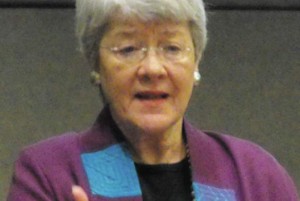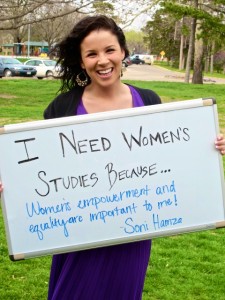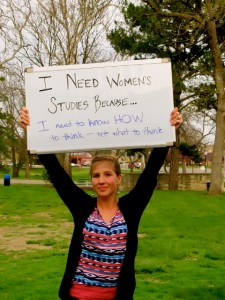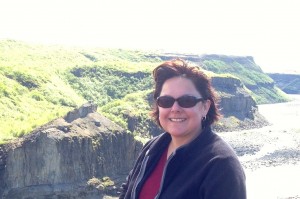
Janice (Jan) Parks Dreiling (’66, ’69 Overland Park) is a feminist lawyer and researcher, and an active member of the Women’s Studies community at Kansas State University. An alumna of Kansas State, she majored in sociology and minored in history. Jan Dreiling completed her B.A. and M.A. in Sociology at Kansas State and her J.D. at the University of Tulsa College of Law. She says that her study of sociology enabled her to understand society and people’s problems when she became a lawyer and a judge. Jan Dreiling retired from the bench in 2006. She now works as an attorney in private practice.
KSU alumna Jan Dreiling is engaged in researching and writing a book on the 1867 campaign for women’s suffrage in Kansas. This campaign was led by a powerful group of women, including Clarina Howard Nichols. As she did her research, Jan Dreiling discovered more about the important role that the Wattle family played in the Moneka Woman’s Rights Association of Linn County. The Association hired Clarina Howard Nichols to go to the Wyandotte Constitutional Convention in 1859 so that she could work for women’s rights in Kansas.
As she studied at K-State and served as a lawyer and judge, Jan became more appreciative of the importance of women’s rights. She realized that she wanted to “do something much bigger than me” and decided to combine her passion for researching women’s history and supporting women’s rights. One of the ways that she did this was to reach out to Women’s Studies at KSU and to support Women’s Studies students by creating a scholarship.
Women’s Studies at Kansas State now has a new scholarship program for Women’s Studies majors because Jan Dreiling decided to express her dedication to gender equality and her commitment to Women’s Studies. Jan Dreiling started a scholarship program for majors in Women’s Studies. It is called the Clarina Howard Nichols Scholarship. This $1,000 scholarship is awarded at the end of each year to a promising major in Women’s Studies who has addressed major social or educational barriers or who has demonstrated an ability to apply academic knowledge to social change contexts.
Because of her research on women who worked for suffrage in Kansas, Jan Dreiling asked that the Women’s Studies scholarship be named after Clarina Howard Nichols. Clarina Howard Nichols was an important 19th century feminist, who moved from the East coast to the Midwest and then to California. She took the lead in Kansas for supporting woman’s rights, including suffrage, when Kansas was becoming a free state in 1861. She played a key role in making sure that the Kansas constitution provided for women’s equal rights to education, women’s right to custody of their children, and married women’s right to acquire and possess property apart from their husbands. Partly with the political urging of Clarina Howard Nichols, participants in Kansas’ 1859 constitutional convention also considered her proposal that women be granted suffrage when Kansas became a state.
Clarina Howard Nichols helped ensure that some rights for women were written into Kansas’ constitution. But suffrage supporters had to work a long time to get all women the right to vote. When Kansas entered the Union as a free state in 1861, delegates to the Wyandotte Convention had not given women the right to vote. Patriarchal control of government and elections kept women from voting in Kansas until 1912. At that time, Kansas became the eighth state where women were allowed to vote. It wouldn’t be until the passing of the 19th amendment in 1920 that women in every state were granted the right to vote. But southern states effectively disenfranchised many African-American women and men, keeping them from exercising their right to vote. Issues related to disenfranchisement continue to be discussed up to this day, especially as they relate to immigration and voter identification.
Getting the rights of women addressed beginning in the1840s took serious leadership skills, courage, and a deep commitment to social equality, democracy, and social justice. Clarina Howard Nichols demonstrated that she had all this and more, and with increasing passion, as she took her children from an abusive husband in the 1840s, got authorization from the Vermont state legislature to divorce, married for a second time to a newspaper editor, found herself supporting the family on her own after her second husband died. She worked for the rest of her life as an advocate for woman suffrage, the rights of women, and temperance, forming close associations with famous suffragists like Susan B. Anthony.
In May 2014, Women’s Studies was proud to offer the Clarina Howard Nichols Scholarship to the first recipient, Sabrina Flowers. We thank Jan Dreiling for making this, and so much more, possible. Thank you, Jan.
In spring 2015, Jan Dreiling will talk about her research on women’s rights and the campaign for women’s suffrage at two Women’s Studies-sponsored events. She will, after a dinner, lecture on Thursday, March 5 (contact Kim Garver at kgarver@ksu.edu to make a reservation) and on Friday, March 6 at 10:30 am in the Hemisphere Room at KSU’s Hale Library (free and open to the public).
— by Torry Dickinson


